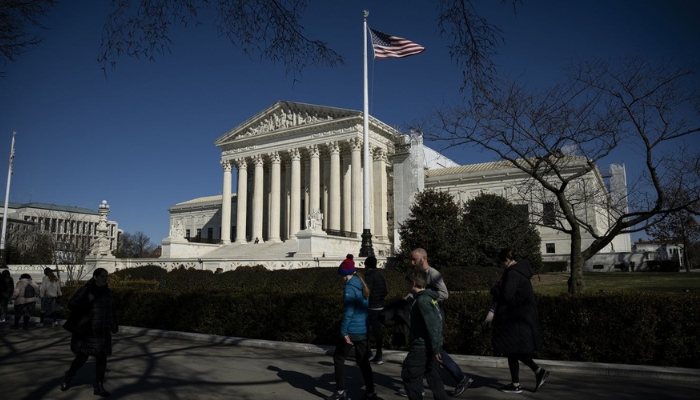US Supreme Court to consider government requests to social media companies
3 min read
The case will decide if the White House violated free speech protections by requesting social networks to remove Covid misinformation
The US Supreme Court is set to hear oral arguments in Murthy v Missouri, a case that could significantly alter the government’s relationship with social media platforms. This lawsuit, backed by Republicans, challenges the actions of federal agencies and the Biden administration, alleging that efforts to combat online misinformation amount to censorship.
The case revolves around whether the White House overstepped free speech boundaries by urging platforms like Twitter and Facebook to remove Covid-19 misinformation. Plaintiffs argue that the government pressured tech companies to alter their policies, censor content, and suspend users. The lawsuit, brought by attorneys general from Louisiana and Missouri, as well as figures like Jim Hoft of a conspiracy theory website, contends that such actions constitute coercion. If successful, the lawsuit could prevent the White House from directly engaging with social media platforms, similar to a prior ruling in favor of the plaintiffs.
The Biden administration has countered these claims, asserting that officials did not use coercion or threats against social media platforms. They argue that federal agencies have frequently engaged with these platforms on issues like terrorist group coordination and foreign influence campaigns. This dialogue has led tech companies to voluntarily enforce their own policies, banning such content.
The White House argued that it did not issue any such threats
The plaintiffs argue that statements from Biden, former White House press secretary Jen Psaki, and Surgeon General Vivek Murthy, urging social media companies to combat misinformation, were tantamount to threats of censorship. The government, however, denies these were threats, stating that officials never suggested legal repercussions for non-compliance.
The White House stated in a brief, “No one disputes that the government would have violated the first amendment if it had used threats of adverse government action to coerce private social-media platforms into moderating content. But no such threats occurred here.”
Experts caution about the public health risks posed by Murthy v. Missouri
The case will explore the boundaries of government influence on tech platforms, particularly the distinction between encouraging action and coercion. There are concerns among public health officials and experts that a favorable outcome for the plaintiffs could lead to the unchecked dissemination of dangerous misinformation on social media. It could also limit the government’s capacity to combat other forms of online falsehoods, such as election misinformation.
Several medical organizations, including the American Medical Association, have previously filed a brief asserting that the government has a compelling interest in combating vaccine misinformation, which, at its core, involves preventing factually incorrect statements from endangering lives. Additionally, several secretaries of state have filed a separate brief arguing that the court’s decision must allow state election officials to communicate with platforms, or else there is a risk that dangerous and potentially illegal falsehoods about elections and voting will spread unchecked.
A Ministry of Truth reminiscent of Orwellian dystopia
Several conservative judges oversaw the case’s progression to the supreme court. Among them was Terry Doughty, appointed by Trump to the rural western district court of Louisiana. Doughty has garnered favor among Republican attorneys general seeking favorable judgments. Bloomberg Law reported that Doughty has presided over the most multi-state challenges against Biden administration policies compared to any other federal judge. He issued a broad preliminary injunction that barred White House officials from communicating with social media companies. In his extensive ruling, he accused federal agencies of assuming a role akin to an Orwellian “Ministry of Truth.”
The ruling arrived amid a broader Republican effort to resist efforts to monitor and address online misinformation. Republicans have issued numerous subpoenas to universities hosting disinformation research programs, threatening legal action if they did not disclose communications with the government. Additionally, they have accused federal agencies of censoring conservative viewpoints.
After Doughty’s ruling, the conservative US Court of Appeals for the Fifth Circuit upheld a portion of the injunction, paving the way for the case to reach the Supreme Court. In October of last year, the Supreme Court temporarily suspended the lower court’s injunction, permitting government officials to resume communicating with platforms. Three conservative justices—Samuel Alito, Clarence Thomas, and Neil Gorsuch—dissented, expressing their preference to maintain the injunction.



